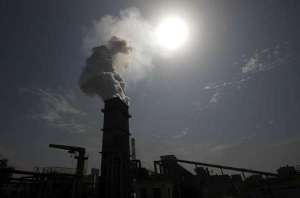
Chinese coal plant Credit: AFP / Getty Images
The International Energy Agency released its annual World Energy Outlook yesterday, and it made for depressing reading if you care about the future of the planet. Barring a change in policy, energy demand—led by the still rapidly growing developing world—will continue to skyrocket, and with it, carbon emissions. Oil prices could easily be $150 a barrel in the near-term—barring an unlikely uptick in supply from the increasingly unstable Middle East—and the use of heavily polluting coal could increase 65% by 2035. In short, unless we do something about it, energy will get more and more expensive—and we’ll be dealing with more pollution, and more warming.
From the report:
In the WEO’s central New Policies Scenario, which assumes that recent government commitments are implemented in a cautious manner, primary energy demand increases by one-third between 2010 and 2035, with 90% of the growth in non-OECD economies. China consolidates its position as the world’s largest energy consumer: it consumes nearly 70% more energy than the United States by 2035, even though, by then, per capita demand in China is still less than half the level in the United States. The share of fossil fuels in global primary energy consumption falls from around 81% today to 75% in 2035. Renewables increase from 13% of the mix today to 18% in 2035; the growth in renewables is underpinned by subsidies that rise from $64 billion in 2010 to $250 billion in 2035, support that in some cases cannot be taken for granted in this age of fiscal austerity. By contrast, subsidies for fossil fuels amounted to $409 billion in 2010.
What’s most frightening is that we may be running out of time to shift our direction on energy policy. The global energy system is a huge beast—more than $5 to $10 trillion is spent on energy each year—and trying to move it is like trying to turn an aircraft carrier on a dime, in the middle of a hurricane. Power plants and transportation networks have operating lives that can be measured in decades—in the U.S., unsustainable development has been dictated by the postwar boom in highway construction and auto-dependent suburbs. Every coal plant built now—barring effective carbon capture and sequestration technology, which has yet to be economically proven—locks in carbon emissions for years.
Now according to the IEA, we have just five more years to shift global energy policy enough to avoid locking in high levels of warming as well. From Fiona Harvey at the Guardian:
If the world is to stay below 2C of warming, which scientists regard as the limit of safety, then emissions must be held to no more than 450 parts per million (ppm) of carbon dioxide in the atmosphere; the level is currently around 390ppm. But the world’s existing infrastructure is already producing 80% of that “carbon budget”, according to the IEA’s analysis, published on Wednesday. This gives an ever-narrowing gap in which to reform the global economy on to a low-carbon footing.
If current trends continue, and we go on building high-carbon energy generation, then by 2015 at least 90% of the available “carbon budget” will be swallowed up by our energy and industrial infrastructure. By 2017, there will be no room for manoeuvre at all – the whole of the carbon budget will be spoken for, according to the IEA’s calculations.
Fatih Birol, the IEA’s chief economist, put it this way: “As each year passes without clear signals to drive investment in clean energy, the lock-in of high-carbon infrastructure is making it harder and more expensive to meet our energy security and climate goals.” There’s a price to delaying action on climate and energy policy—which is exactly what we’re doing. The longer we delay, the worse it will get—and the harder it will be to save ourselves.
There’s plenty more worth reading in the IEA report—check out the executive summary here (PDF)—especially on the declining role of nuclear post-Fukushima, and the global rise of gas. But at least remember the takeaway: act now or never on energy and climate.
Bryan Walsh is a senior writer at TIME. Find him on Twitter at @bryanrwalsh. You can also continue the discussion on TIME’s Facebook page and on Twitter at @TIME


